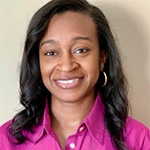Courtney Thompson
 Courtney Thompson
Courtney Thompson
Director of Financial Aid
Lenoir-Rhyne University
SASFAA
Courtney Thompson started her career in admissions and enrollment management, which she said has always been about working outside of silos and collaborating. That's a mindset she carried with her when she jumped into financial aid 16 years ago at Lenoir-Rhyne University — her alma mater — where she currently serves as the institution's director of financial aid.
"My years of service at Lenoir Rhyne University have given me a knowledge of not only the financial aid office, but also of the inner workings of the Enrollment Management Division as a whole," Courtney said. "Too often I hear from other aid administrators that there is little collaboration between themselves and other offices on campus, and to me that is to the detriment of the university. There should be an understanding from all areas that we are working toward the same goal of higher education for our students, and an openness for well rounded, complete discussions."
As a woman of color at a private university, Courtney has sought to use her experiences to empower others and represent diversity on campus.
"I want to be a part of the conversation. As minority aid administrators, we bring a different voice to the conversation of higher education. We often bring with us an experience of those who are less fortunate, less vocal, and underrepresented," Courtney said. "Which also represents those students who are most impacted by the changes to federal, state, and institutional aid. It is essential that we be a part of the conversation, and programs like this make that possible on a larger scale."
Learn more about Courtney in the brief Q&A below.
How have you seen diversity in higher education change since you began your career?
Since beginning my career, I think the most noticeable change I've seen is a concerted effort taken by institutions to bring diversity to its campuses. Having been in higher education for a couple of decades, I've had the opportunity to see how the goal of campus diversification has changed. In the realm of liberal arts schools, the idea of having a campus that forms and engages the well-rounded student is critical and diversity is a key component. Diversity has often been a talking point for campuses, but in recent years you can really see tangible efforts by campus administration to increase the diversity and complexity of their campuses. I've seen these changes represented in student recruitment, campus infrastructure, and staff/faculty hiring. It is encouraging to me to see these changes, and I'm hopeful that this forward trajectory will continue.
What are some of your life goals?
Over the years my life goals have changed, but at this point in my life I think the things that are most important to me center around being a positive role model for girls and young women of color. I want to be sure that every day I'm performing my job with proficiency, integrity, and grace. I want to leave this profession knowing that I've made a meaningful impact on my university. I hope to open the door for other minorities to see a future in the field of higher education. Personally, I want to travel more, learn to speak another language fluently, and obtain my Ph.D. in higher education.
How did you get your start in financial aid?
My 23-year career in higher education began in admissions. I spent around seven years working in the admissions office at Lenoir Rhyne University, when a position came open in financial aid. I enjoyed working with students as they took those first steps into the pursuit of post-secondary education, but I wanted to have more of an impact. I applied for the position, with the support of both the director of admissions and the director of financial aid. We all agreed that my skill set and personality would go a long way in strengthening the financial aid team. As a financial aid counselor, I was able to assist students in making their goal of pursuing a college degree a reality, and that was — and continues to be — the best part of my job. As director of financial aid, I don't have as much student-facing contact as I used to, but I still find great pleasure in helping a student "figure it out" and no longer have the financial worries that can sometimes come with pursuing a college degree.
What do you do when you're not working?
When I'm not working, I enjoy spending time with my family and friends. My husband and I have two children in very different phases of life, a 21-year-old son soon to graduate from college, and a 6-year-old daughter in first grade. As you can imagine, both of them require very different levels of parenting, but they manage to keep us busy and entertained at all times. My favorite pastime is having a good meal with my husband and/or girlfriends. I'm a self-proclaimed foodie, and find great joy in discovering new restaurants and cuisines to explore. I also enjoy reading, watching movies, and traveling.
Any hidden talents?
I don't know that I have any hidden talents in the conventional sense, but one ability that I likely would not have discovered if not for the pandemic, is that I'm a pretty good home-school teacher. I've always been one to say that it takes a special person with particular characteristics to teach and would never minimize all the work that those in the teaching profession put in, but I've found that I have a few of those characteristics myself. As a result, I've managed to bring some enjoyment to my daughter's fully virtual learning experience. I never considered home schooling either of our children because I didn't think it fit well with my personality or our familial needs, but to know that I can "do it in a pinch" gives me a bit of pride.
Publication Date: 2/24/2021



